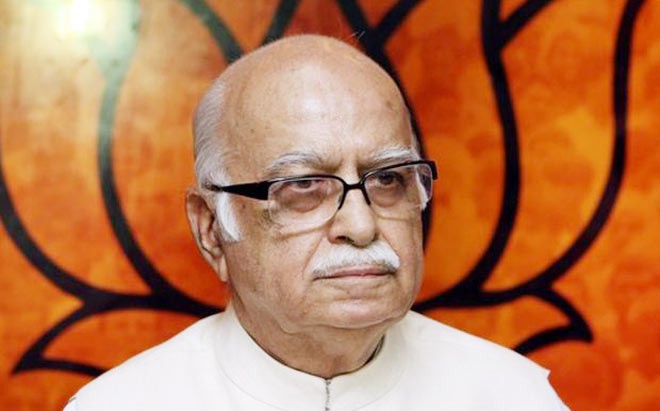
Times are bad for LK Advani. So bad enough that when the Bharatiya Janata Party's first list of candidates was announced on 21 March, even the Congress party noted that the absence of Advani's name was a decisive and disrespectful shove.
Few things could be more antithetical to Advani's politics than the Congress and it is a mark of how fortunes have deteriorated for the 91-year-old that he has been reduced to a topic for a pre-poll Twitter snub by the Opposition party.
The talking point of BJP's first list of candidates, where one Amit Shah has replaced Advani in the Gandhinagar Lok Sabha seat, was undoubtedly Advani and his exclusion.
No competition for Modi, Shah
He first filed his nomination from this seat in 1991 — a photograph tweeted by the account @IndiaHistoryPics shows a young Narendra Modi helping him and a younger Amit Shah peering down from above. In the three decades since, Advani has only "given up" the seat once, to close friend and former prime minister Atal Bihari Vajpayee. The seat has been Advani's mainstay since 1998 in an incredible run of election victories to which the 2019 polls clearly will not be added.
Articles like these, therefore, look to be one of the last times when Advani dominates political news. Advani now has no opportunity to contribute to the country's legislation. His output in party matters, too, had long since been minimalised.
Like Congress spokesperson Randeep Singh Surjewala observed on Twitter, in 2014 Advani was elevated and thus relegated into the non-performative echelons of a Margdarshak Mandal. On 26 August of the year, close on the heels of Modi's resounding victory in the General Elections, Amit Shah had announced the constitution of a new parliamentary board of the party with Vajyapee, Advani and Murli Manohar Joshi excluded from it for the first time in decades. The three were sent to the newly minted mentors' Mandal, which a report in The Hindu says has never met officially since.
Advani has not just been snubbed by Narendra Modi and Amit Shah. Under the Modi-Shah juggernaut, the man who in 1991 led a rath yatra that many credit with heralding the Babri Masjid demolition and shaping the BJP's aggressive Hindutva line, has dropped many popularity points from party workers too.
Narendra Modi once again assists LK Advani in filing nominations for the 2014 Lok Sabha election. Reuters
Narendra Modi once again assists LK Advani in filing nominations for the 2014 Lok Sabha election. Reuters
This time, reported DNA, the BJP's Gujarat unit had demanded of its central election committee that either Modi or Shah contest the Lok Sabha election from the state. To party observers sent to seek the opinion of grassroots political participants in Gandhinagar, the message was clear. The grand old man had to go.
Party observers Nimaben Acharya and Prithviraj Patel both noted that while BJP workers were keen on someone from the party's central leadership contesting from Gandhinagar, that person was no longer Advani.
Second to Vajpayee
Advani himself is no stranger to losing out to other figures. For a man so central to the BJP's revival and image, it is almost surprising how many of the big prizes he has been denied. Always the man who could be prime minister, Advani always remained in the shadow of a far less vocal figure, Vajpayee. The only time he was projected as a prime ministerial candidate, in 2009, he lost.
A report by Hindustan Times, after Vajpayee's death in 2018, noted that both leaders had had similar beginnings in the Rashtriya Swayamsevak Sangh and had proven themselves selfless party workers. Vajpayee, who was older than Advani by three years took over the Jana Sangh after Deen Dayal Upadhyay's death in 1968. Advani followed soon after under the tutelage of Vajpayee.
In 1975, Indira Gandhi announced the Emergency, leading to jail stints for both the leaders. When it was lifted in 1977, Advani and Vajpayee spearheaded the decision to merge the Jana Sangh with the overarching Janata Party, that would win the election of that year.
At key moments, in key roles, it was always Vajpayee who was visible. In the first opposition rally in New Delhi since the Emergency, where leaders who had recently been released from prison spoke, it was Vajpayee's quiet poetry which drew the applause.
When the first non-Congress government was formed in the country in 1977, it was Vajpayee who got the Minister of External Affairs' role. Advani got the far less visible Information and Broadcasting Ministry.
In 1984, the BJP won only two seats, in the backdrop of a crumbling leadership and an emotional electorate voting Rajiv Gandhi to power after his mother's assassination.
When the whole of India was looking to a younger prime minister for the end of the licence raj, Advani acted cleverly and introduced to the political landscape an entirely new dimension by co-opting the Vishwa Hindu Parishad's murmurs on a particular issue. Thus began the Ram Janmabhoomi-Babri Masjid stir, which would serve the dual purpose of bringing the BJP back to people's minds and earning for Advani a brand of notoriety that would cost him both popularity and position.
The highest Advani rose to was the position of the deputy prime minister, under Vajpayee in 2002. Several times, he has maintained that he sees himself as a prime ministerial candidate, but the 2004 loss of the BJP under his leadership took away the strength of his insistence.
The 2019 exit from the party's candidates' list have made sure that such a day will never come to pass.


.jpeg)

